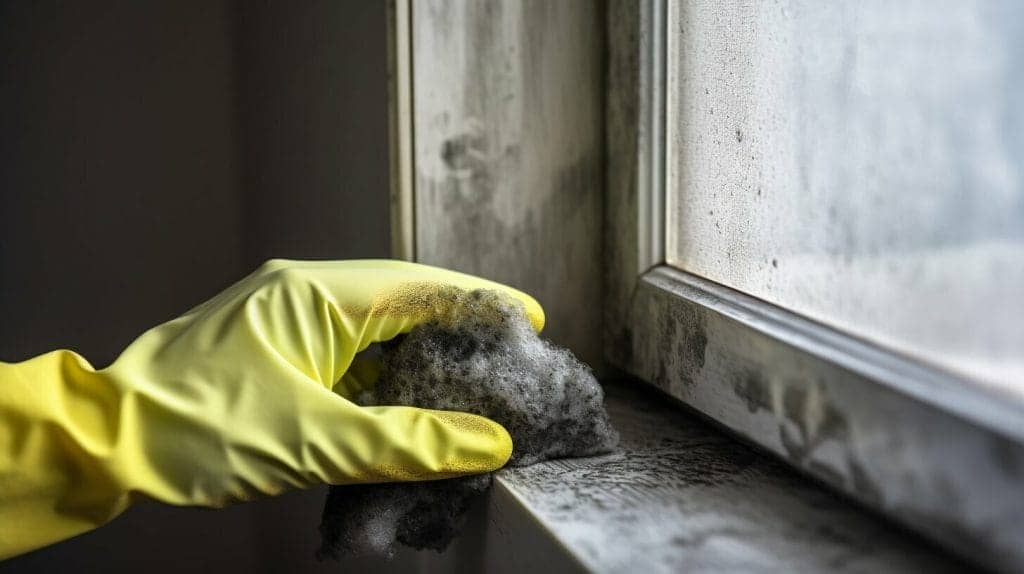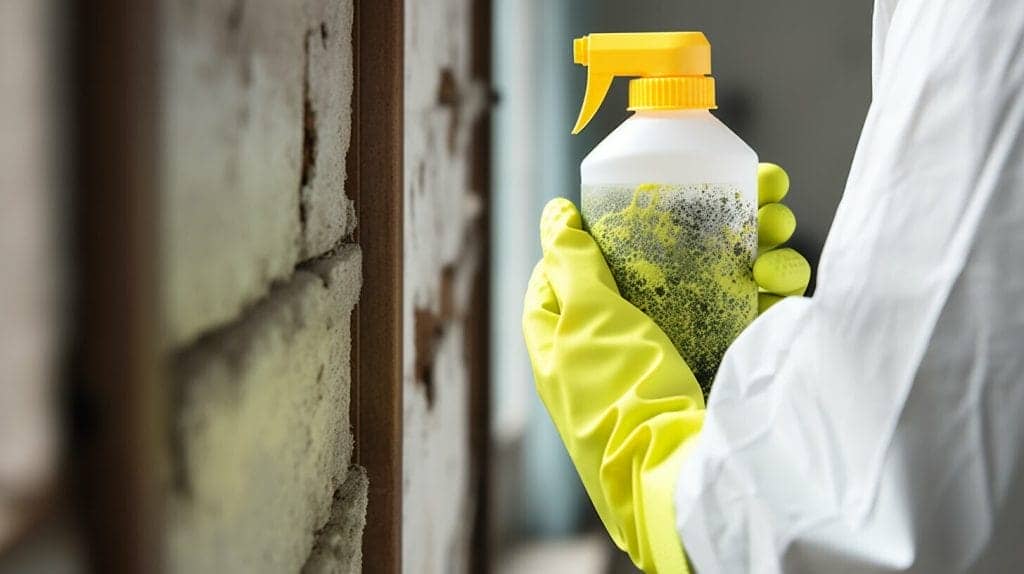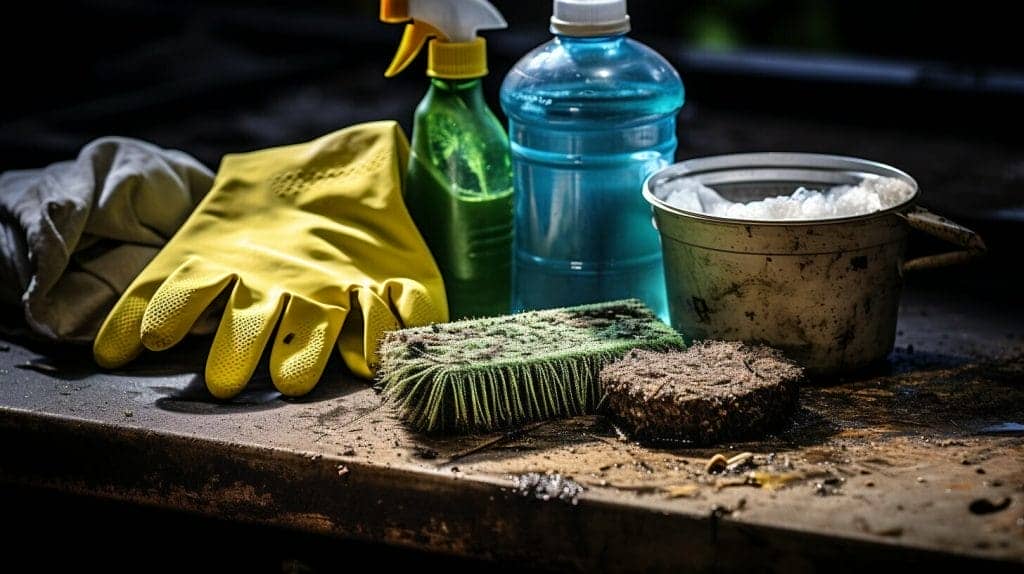Welcome to our article on the potential link between toxic mold and brain lesions. Many of us may not be aware of the serious health risks associated with mold exposure, including the potential for neurological damage. In this article, we will explore the question – Can toxic mold cause brain lesions? We will also delve deeper into the various health risks associated with toxic mold exposure, the potential link to neurological disorders, and the prevention and treatment of mold-related illnesses. So, let’s get started.
Understanding Toxic Mold and its Effects on Health
Toxic mold, also known as black mold, is a type of fungus that can grow in damp environments and can cause a range of health problems. Mold can produce allergens, irritants, and toxins that can be harmful to the body, particularly the respiratory system. When inhaled or ingested, these substances can cause a variety of symptoms, ranging from mild to severe.
The health risks of toxic mold exposure depend on several factors, including the duration and level of exposure, the individual’s immune system, and the type of mold present. While some people may experience no symptoms at all, others may develop allergic reactions, respiratory problems, or more serious illnesses.
How Does Mold Growth Occur?
Mold growth occurs when damp conditions are present, and can be found in many areas of the home including bathrooms, kitchens, and basements. Some common causes of mold growth include water leaks, flooding, high humidity, and poorly ventilated areas. When these conditions are present, mold spores can begin to grow and spread.
Potential Effects on the Respiratory System
Exposure to toxic mold can cause a variety of respiratory problems, including coughing, wheezing, and shortness of breath. In some cases, exposure to mold can also trigger asthma attacks. People with compromised immune systems or pre-existing respiratory conditions may be more susceptible to these effects.
Other Potential Effects on the Body
In addition to respiratory problems, exposure to toxic mold can also cause other health problems such as headaches, fatigue, and skin irritation. Some studies suggest that toxic mold exposure may also be linked to neurological disorders, such as memory loss and difficulty concentrating.
It is important to note that not all molds are toxic, and not all people will experience adverse health effects from mold exposure. However, if you suspect that you have mold in your home, it is important to take steps to address the problem promptly in order to prevent potential health risks.
What are Brain Lesions?
Brain lesions are areas of abnormal tissue that can be caused by a variety of factors, including injury, infections, and diseases. Essentially, a brain lesion is any damage or abnormality that occurs within the brain.
There are several different types of brain lesions, including:
- Ischemic lesions: caused by a lack of blood flow to the brain
- Hemorrhagic lesions: caused by bleeding in or around the brain
- White matter lesions: caused by damage to the brain’s white matter
- Gray matter lesions: caused by damage to the brain’s gray matter
Brain lesions can manifest in a number of ways, depending on their location and size. Some common symptoms of brain lesions include headaches, seizures, cognitive impairment, and changes in motor function.
Neurological Disorders Linked to Toxic Mold Exposure
Research has suggested a potential link between toxic mold exposure and a range of neurological disorders, including multiple sclerosis, Parkinson’s disease, and Alzheimer’s disease.
Multiple sclerosis (MS) is a chronic disease that affects the central nervous system, causing symptoms such as muscle weakness, problems with coordination and balance, and impaired vision. Studies have found that people who live in damp or moldy environments may be more likely to develop MS than those who do not.
Parkinson’s disease is a progressive disorder that affects movement, with symptoms including tremors, rigidity, and difficulty with balance and coordination. Some studies have suggested that environmental factors, including exposure to toxins like mold, may play a role in the development of Parkinson’s disease.
Alzheimer’s disease is a neurodegenerative disorder that affects memory and cognitive function, with symptoms including memory loss, confusion, and mood changes. While the exact causes of Alzheimer’s disease are not fully understood, some researchers have suggested that exposure to environmental toxins, including mold, may increase the risk of developing the disease.
While further research is needed to fully understand the link between mold exposure and neurological disorders, these findings highlight the potential risks associated with living in damp or moldy environments.
The Cognitive Impairment Connection
Exposure to toxic mold can have a significant impact on cognitive function, with memory, attention, and concentration being some of the most commonly affected areas. This can occur due to the mycotoxins released by certain types of mold, which can cause inflammation and damage to the brain.
Research has also shown that exposure to toxic mold can lead to long-term cognitive impairment, particularly in individuals who have been exposed for an extended period of time. Symptoms of such impairment may include difficulty learning new information, problems with communication, and reduced problem-solving abilities.
How Does Toxic Mold Affect the Brain?
Toxic mold exposure can impact the brain in several ways. The mycotoxins released by mold can cause inflammation and damage to the brain, which can lead to cognitive impairment. The toxins can also weaken the blood-brain barrier, which normally protects the brain from harmful substances in the bloodstream. This can allow toxins to enter the brain and cause further damage.
What Are the Symptoms of Cognitive Impairment from Toxic Mold Exposure?
The symptoms of cognitive impairment from toxic mold exposure can vary depending on the individual and the length of exposure. Common symptoms may include:
- Difficulty learning new information
- Problems with communication and language
- Reduced problem-solving abilities
- Decreased attention and concentration
- Short-term memory loss
- Confusion or disorientation
Can Cognitive Impairment from Toxic Mold Exposure Be Reversed?
While some degree of cognitive impairment from toxic mold exposure may be irreversible, there are steps that can be taken to improve brain function. These may include cognitive rehabilitation, which involves various exercises to improve cognitive abilities, and changes to the individual’s environment to reduce exposure to mold. In some cases, medication may also be prescribed to alleviate symptoms.
It is important to note that early diagnosis and treatment are crucial in minimizing the long-term effects of cognitive impairment from toxic mold exposure.
Mold-Related Illnesses That Could Affect Brain Health
Exposure to toxic mold can result in a range of illnesses, some of which can affect brain health. Mold-related illnesses are typically caused by inhaling mold spores or by coming into contact with mold through the skin or eyes. Here are some of the most common mold-related illnesses that could affect brain health:
| Illness | Symptoms |
|---|---|
| Chronic Fatigue Syndrome | Fatigue, weakness, muscle pain, joint pain, headaches |
| Fibromyalgia | Muscle pain, fatigue, sleep disturbances, memory problems |
| Mold-Induced Asthma | Coughing, wheezing, chest tightness, shortness of breath |
| Sick Building Syndrome | Headaches, dizziness, nausea, fatigue, irritability |
While these illnesses can have a range of symptoms, they all have the potential to affect brain health. For example, chronic fatigue syndrome and fibromyalgia can lead to cognitive impairment, memory problems, and difficulty concentrating. Mold-induced asthma can also impact cognitive function due to the respiratory distress it causes.
It is important to note that not everyone exposed to toxic mold will experience these illnesses. However, those who are especially susceptible, such as individuals with weakened immune systems or existing respiratory conditions, may be more at risk.
Risk Factors for Toxic Mold Exposure
Unfortunately, toxic mold can grow in a variety of settings and can affect anyone. However, there are certain risk factors that can increase your likelihood of exposure.
| Risk Factors | Explanation |
|---|---|
| Living in damp environments | Moisture attracts mold growth and creates an optimal environment for spores to thrive. |
| Poor ventilation | Without proper ventilation, humidity can build up and cause mold to develop. |
| Water damage | Leaking pipes, floods or other water damage can lead to mold growth. |
| Compromised immune system | People with weakened immune systems, such as those with HIV, cancer or autoimmune diseases, are more susceptible to the toxic effects of mold. |
| Occupations with mold exposure | Jobs that involve working in damp or moldy environments, such as construction or farming, can put employees at a higher risk of exposure. |
It is important to be aware of these risk factors and take necessary precautions to reduce your chances of exposure.
Prevention and Treatment of Mold Exposure
If you suspect that your home has mold, the first step is to get it tested by a professional. If it turns out that you do have mold, there are several steps you can take to prevent further exposure:
- Keep your home dry and well-ventilated.
- Repair any leaks or water damage immediately.
- Use a dehumidifier in areas with high humidity.
- Clean any visible mold with a solution of vinegar and water.
- Regularly check for mold growth in areas such as the bathroom, kitchen, and basement.
If you have already been exposed to toxic mold, there are several treatment options available:
| Treatment | Description |
|---|---|
| Antifungal medication | This medication is used to treat fungal infections, including those caused by toxic mold. |
| Allergy medication | These medications can help to relieve symptoms such as sneezing, itching, and watery eyes. |
| Oxygen therapy | This therapy involves breathing in pure oxygen, which can help to reduce inflammation in the body. |
Preventing Mold Growth in the Home
If you want to prevent mold growth in your home, there are several strategies you can use:
- Keep your home dry and well-ventilated.
- Repair any leaks or water damage immediately.
- Use a dehumidifier in areas with high humidity.
- Clean any visible mold with a solution of vinegar and water.
- Regularly check for mold growth in areas such as the bathroom, kitchen, and basement.
By following these steps, you can help to protect yourself and your family from the health risks associated with toxic mold exposure.
Seeking Legal Recourse for Mold-Related Illnesses
If you or a loved one has suffered from mold-related illness or injury, it is important to understand your legal options. In some cases, it may be possible to seek compensation for medical expenses, lost wages, and pain and suffering.
However, proving a link between toxic mold exposure and brain lesions or other health problems can be challenging. It is important to gather medical records and other evidence to support your claim.
If you believe that your health has been negatively impacted by toxic mold, you may want to consider speaking with a personal injury attorney who has experience with mold-related cases. They can help you understand your legal options and guide you through the process of seeking compensation.
Factors to Consider When Seeking Legal Recourse for Mold-Related Illnesses
When pursuing legal action for mold-related illness or injury, there are several key factors to consider:
| Factor | Description |
|---|---|
| Causation | Proving that the mold exposure directly caused the illness or injury can be difficult, as there may be other factors involved. |
| Statute of limitations | Each state has a specific time limit within which legal action must be taken, so it is important to act quickly. |
| Severity of illness/injury | The severity of the illness or injury and the impact it has had on the individual’s life will be taken into account when determining compensation. |
| Damages | The amount of compensation that can be awarded will depend on the specific damages incurred, such as medical expenses and lost wages. |
It is also important to note that some insurance policies may cover mold-related illnesses or injuries. It is worth reviewing your policy or speaking with your insurance provider to determine your coverage.
FAQ About Toxic Mold and Brain Lesions
Q: Can toxic mold cause brain lesions?
A: The potential link between toxic mold and brain lesions is still being studied by researchers. While there is not yet conclusive evidence linking the two, exposure to toxic mold has been known to cause respiratory issues and may contribute to other health problems.
Q: What are some symptoms of mold-related illnesses?
A: Symptoms can vary depending on the type of illness, but may include respiratory issues, allergies, headaches, and fatigue. In more severe cases, mold-related illnesses may cause neurological symptoms such as memory loss and difficulty concentrating.
Q: Who is most at risk for mold exposure?
A: Those living in damp or humid environments, with poor ventilation, or with water damage in their homes are at higher risk for mold exposure. Individuals with weakened immune systems, allergies, or pre-existing respiratory conditions may also be more susceptible to the effects of toxic mold.
Q: How can I prevent toxic mold exposure?
A: Keeping indoor spaces dry and well-ventilated is key to preventing mold growth. Fixing leaks and addressing water damage promptly can also help prevent mold growth. It’s also important to use proper personal protective equipment when cleaning up mold.
Related: Are You at Risk for Mold Exposure? Find Out Now!
Q: Is there a cure for mold-related illnesses?
A: Treatment for mold-related illnesses may vary depending on the specific illness and severity of symptoms. Treatment may include medication for respiratory issues, allergy symptoms, or neurological symptoms caused by mold exposure.
Q: Are there any legal options for those who have suffered from mold-related illnesses?
A: It may be possible to seek legal recourse if you have been exposed to toxic mold and suffered from related illnesses or injuries. Seeking the advice of a legal professional with experience in toxic mold cases can help determine if legal action is an option for your situation.
Q: What steps should I take if I suspect mold exposure?
A: If you suspect you have been exposed to toxic mold, it’s important to contact a healthcare professional for evaluation and treatment. Addressing any mold growth in your home or work environment should also be a priority to prevent further exposure.
Related: Tips for Tackling Mold Growth in Your Home
Q: How can I know if my home has toxic mold?
A: If you suspect mold growth in your home, it’s important to seek the help of a professional to properly identify and remove any mold growth. Signs of mold growth may include a musty odor, visible mold growth, or water damage in the home.
Dr. Francisco Contreras, MD is a renowned integrative medical physician with over 20 years of dedicated experience in the field of integrative medicine. As the Medical Director of the Oasis of Hope Hospital in Tijuana, Mexico, he has pioneered innovative treatments and integrative approaches that have been recognized globally for the treatment of cancer, Lyme Disease, Mold Toxicity, and chronic disease using alternative treatment modalities. Dr. Contreras holds a medical degree from the Autonomous University of Mexico in Toluca, and speciality in surgical oncology from the University of Vienna in Austria.
Under his visionary leadership, the Oasis of Hope Hospital has emerged as a leading institution, renowned for its innovative treatments and patient-centric approach for treating cancer, Lyme Disease, Mold Toxicity, Long-Haul COVID, and chronic disease. The hospital, under Dr. Contreras's guidance, has successfully treated thousands of patients, many of whom traveled from different parts of the world, seeking the unique and compassionate care the institution offers.
Dr. Contreras has contributed to numerous research papers, articles, and medical journals, solidifying his expertise in the realm of integrative medicine. His commitment to patient care and evidence-based treatments has earned him a reputation for trustworthiness and excellence. Dr. Contreras is frequently invited to speak at international conferences and has been featured on CNN, WMAR2 News, KGUN9 News, Tyent USA, and various others for his groundbreaking work. His dedication to the medical community and his patients is unwavering, making him a leading authority in the field.
Contreras has authored and co-authored several books concerning integrative therapy, cancer, Lyme Disease and heart disease prevention and chronic illness, including "The Art Science of Undermining Cancer", "The Art & Science of Undermining Cancer: Strategies to Slow, Control, Reverse", "Look Younger, Live Longer: 10 Steps to Reverse Aging and Live a Vibrant Life", "The Coming Cancer Cure Your Guide to effective alternative, conventional and integrative therapies", "Hope Medicine & Healing", "Health in the 21st Century: Will Doctors Survive?", "Healthy Heart: An alternative guide to a healthy heart", “The Hope of Living Cancer Free”, “Hope Of Living Long And Well: 10 Steps to look younger, feel better, live longer” “Fighting Cancer 20 Different Ways”, "50 Critical Cancer Answers: Your Personal Battle Plan for Beating Cancer", "To Beat . . . Or Not to Beat?", and “Dismantling Cancer.”





















